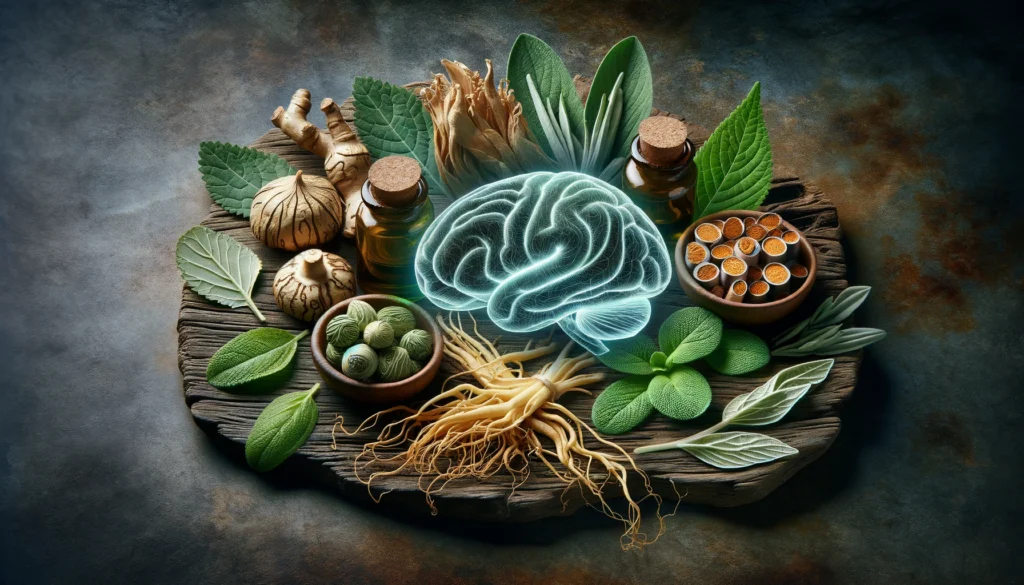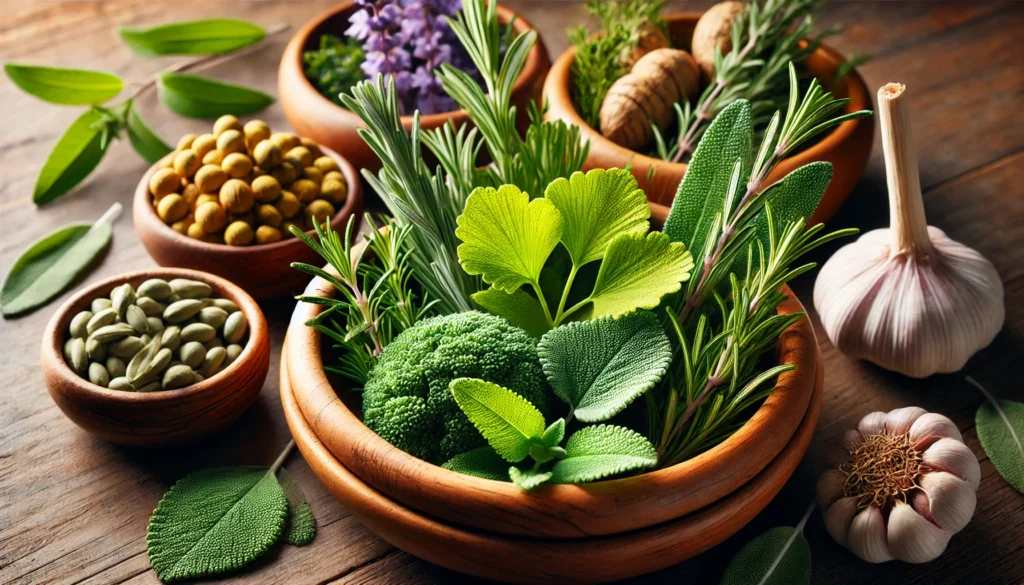For centuries, herbs have been used in various cultures for their medicinal properties. While modern science continues to explore and validate these traditional practices, many herbs have been found to have significant effects on cognitive function. They can aid in memory retention, enhance focus, and even support brain cell regeneration.
You may also like: Effective Exercises to Boost Your Focus
Historical Context of Herbal Use
Historically, herbs have played a crucial role in healing practices worldwide. Ancient civilizations such as the Greeks, Egyptians, and Chinese relied heavily on herbal remedies to treat a myriad of ailments, including cognitive decline. In Greek culture, for example, scholars and philosophers often used herbs to enhance mental acuity during debates and intellectual endeavors.
Similarly, in ancient China, herbal formulations were an integral part of medical treatises and were used to fortify the mind. Herbs were also a key part of rituals designed to promote mental clarity and focus. Discover some of the most effective herbs used historically and how they are validated for enhancing mental clarity today.
In addition to these ancient practices, many indigenous cultures across the globe have their own herbal traditions. These cultures often used locally sourced plants to create remedies for boosting brain function and overall health. The wisdom of these traditional practices continues to influence modern herbal medicine, prompting a renewed interest in the use of herbs for cognitive health.
Modern Scientific Validation
The intersection of traditional knowledge and modern science has opened new avenues for understanding the efficacy of herbs. Researchers are using advanced techniques to isolate active compounds in herbs and determine their effects on brain function.
Strategic approaches are being developed to maximize the cognitive benefits of these herbal compounds. Learn more about enhancing mental clarity through scientifically backed herbal practices.
Scientific validation is crucial, as it provides empirical evidence supporting traditional claims, bridging the gap between anecdotal evidence and scientific proof.
Furthermore, clinical trials have been conducted to assess the cognitive benefits of various herbs. These studies often focus on parameters such as memory enhancement, concentration improvement, and neuroprotection. As science delves deeper into these natural remedies, it validates the age-old wisdom of using herbs for mental clarity and focus.
Cultural Significance and Herbal Traditions
Herbs have not only medicinal but also cultural significance, as they are often intertwined with rituals and traditions. In many cultures, the use of herbs is a holistic practice that encompasses physical, mental, and spiritual well-being. For instance, in Ayurvedic traditions, herbs are used in conjunction with meditation and yoga to promote overall balance.
This holistic approach is gaining traction in the West as people look for integrative methods to enhance their cognitive health. The resurgence of herbalism is a testament to the enduring legacy of traditional practices, which are being adapted to meet contemporary wellness needs. By understanding the cultural significance of herbs, individuals can appreciate their multifaceted roles in promoting mental clarity and focus.
Top Herbs for Focus and Memory
Ginkgo Biloba
Ginkgo Biloba is perhaps one of the most well-known herbs for enhancing memory and concentration. Originating from China, this ancient herb has been shown to improve blood circulation to the brain, which is essential for cognitive function. It also contains antioxidants that protect the brain from oxidative stress.
Ginkgo’s ability to boost cerebral circulation is particularly beneficial for aging populations. As we age, blood flow to the brain can diminish, leading to cognitive decline. By enhancing circulation, Ginkgo helps maintain mental sharpness, making it a popular choice among older adults seeking to preserve cognitive health.
Additionally, Ginkgo’s antioxidant properties combat free radicals, which can damage brain cells and contribute to cognitive disorders. This protective effect makes it a powerful ally in the fight against age-related cognitive decline.
Integrating Ginkgo Biloba into your morning rituals can also amplify its memory-boosting effects. Discover how simple habits can enhance your cognitive health.
Bacopa Monnieri
Bacopa Monnieri, also known as Brahmi, is a staple in Ayurvedic medicine. This herb is revered for its ability to improve memory and cognitive performance. Studies suggest that Bacopa may enhance the brain’s ability to process information, making it a powerful ally for those seeking to boost their mental acuity.
One of the key mechanisms through which Bacopa exerts its effects is by modulating neurotransmitter activity. It influences serotonin and dopamine levels, both of which play crucial roles in mood regulation and cognitive function. This modulation can lead to improved focus and a greater capacity for learning.
Furthermore, Bacopa is known for its neuroprotective properties. It helps shield brain cells from damage and supports the growth of new neurons. This dual action not only enhances cognitive performance but also contributes to long-term brain health, making Bacopa a valuable addition to any cognitive enhancement regimen.
Incorporating natural brain-healing methods, including Bacopa, can support long-term mental health. Explore additional approaches to enhance cognitive resilience.

Rhodiola Rosea
Known for its adaptogenic properties, Rhodiola Rosea helps the body adapt to stress, which can be a significant barrier to maintaining focus. It has been shown to reduce fatigue and improve mental performance, making it an excellent choice for those who need to stay alert and focused under pressure.
Rhodiola’s adaptogenic nature means it helps balance the body’s stress response systems. By modulating cortisol levels, it reduces the impact of stress on mental clarity and concentration. This makes it particularly beneficial for individuals who face high-pressure situations in their daily lives.
In addition to stress reduction, Rhodiola enhances energy levels and endurance. This boost in physical and mental stamina can lead to improved focus and productivity, especially during long periods of work or study. Incorporating Rhodiola into one’s routine can thus provide a comprehensive approach to managing stress and enhancing cognitive function.
Simple tips, such as combining herbs with a healthy lifestyle, can greatly amplify their benefits for brain health. Explore effective ways to enhance your routine.
Ashwagandha
Another Ayurvedic herb, Ashwagandha, is praised for its stress-reducing effects. Chronic stress can impair cognitive function, but Ashwagandha helps to modulate the body’s stress response, thereby supporting mental clarity and concentration.
Ashwagandha’s ability to reduce stress is largely attributed to its impact on the hypothalamic-pituitary-adrenal (HPA) axis. By regulating this system, it helps balance hormone levels and reduce the physiological effects of stress. This balance is crucial for maintaining focus and preventing the mental fatigue that often accompanies chronic stress.
Moreover, Ashwagandha is known to enhance sleep quality, which is vital for cognitive function. Adequate rest is essential for memory consolidation and mental clarity. By promoting restful sleep and reducing stress, Ashwagandha offers a holistic solution for enhancing focus and cognitive performance.
Ashwagandha is also being studied for its role in improving overall mental well-being and reducing stress-related disorders. Discover the broader connections between mental health and herbal interventions.
Gotu Kola
Gotu Kola is often called the “herb of longevity” in traditional Chinese medicine. It is believed to enhance memory and intelligence by promoting circulation and reducing anxiety. Its neuroprotective properties make it an ideal choice for those looking to maintain cognitive health.
One of the standout features of Gotu Kola is its ability to improve microcirculation. This enhancement ensures that brain cells receive the necessary nutrients and oxygen, which are critical for optimal cognitive function. Improved circulation can lead to sharper focus and better memory retention.
Additionally, Gotu Kola has calming effects that can reduce anxiety and promote a sense of mental clarity. By alleviating anxiety, it helps individuals maintain focus, especially in high-stress environments. The combination of these benefits makes Gotu Kola a comprehensive option for supporting cognitive health.
Enhancing your brain’s overall health requires a combination of nutrient-rich herbs and consistent lifestyle practices. Discover strategies for holistic cognitive improvement.

Lion’s Mane Mushroom
While technically not an herb, Lion’s Mane Mushroom deserves mention for its remarkable effects on brain health. This mushroom is known to stimulate nerve growth factor production, which is crucial for the regeneration of brain cells and improved cognitive function.
Lion’s Mane’s ability to stimulate nerve growth factor (NGF) is particularly significant for neurogenesis, the process of creating new neurons. This regeneration supports learning, memory, and overall brain plasticity, making Lion’s Mane a valuable supplement for cognitive enhancement.
Furthermore, Lion’s Mane has anti-inflammatory properties that can protect brain tissue from damage. By reducing inflammation, it helps maintain brain health and function, particularly in aging populations. The combination of neurogenesis and anti-inflammatory effects positions Lion’s Mane as a powerful tool for cognitive enhancement and brain health maintenance.
Reducing brain plaque is a crucial strategy for maintaining cognitive health, especially in aging populations. Learn more about effective methods for long-term brain support.
The Science Behind Herbal Efficacy
Current Trends in Herbal Research
The scientific community is increasingly interested in understanding how herbs can impact brain health. Recent studies have explored the mechanisms by which these herbs exert their effects, such as enhancing neuroplasticity, reducing inflammation, and increasing antioxidant activity.
One current trend in herbal research is the focus on neuroplasticity, the brain’s ability to adapt and reorganize itself. Herbs that enhance neuroplasticity can aid in learning and memory retention, offering potential therapeutic benefits for cognitive impairments. T
Techniques to improve brain plasticity are vital for enhancing learning and memory. Discover innovative approaches that integrate herbal interventions for optimal neuroplasticity.
Another area of interest is the anti-inflammatory properties of herbs. Chronic inflammation is a known contributor to cognitive decline and various neurological disorders. By identifying herbs that reduce inflammation, researchers aim to develop natural solutions for preserving brain health and preventing cognitive deterioration.

Future Implications
As research continues, we can expect to see more evidence supporting the use of herbs for cognitive enhancement. This could lead to the development of more effective herbal supplements and treatments for cognitive decline.
The future of herbal research holds promising implications for personalized medicine. As we gain a deeper understanding of how individual herbs interact with various biological systems, we can tailor herbal treatments to meet specific cognitive needs. This personalized approach could revolutionize how we enhance and preserve brain health.
Furthermore, the integration of herbal remedies into conventional medicine is likely to increase. As evidence mounts, healthcare providers may begin to incorporate herbal supplements into treatment plans for cognitive impairments, offering patients a more holistic approach to brain health. This integration could redefine the landscape of cognitive enhancement therapies.
Challenges and Opportunities
While the potential of herbs for cognitive enhancement is immense, there are challenges that need to be addressed. Standardization of herbal supplements is a significant concern, as variations in potency and quality can affect efficacy. Researchers are working to establish standardized protocols to ensure consistent and reliable results.
Opportunities also abound in the field of herbal research. The growing interest in natural health solutions is driving innovation in herbal formulations and delivery methods. This innovation is expanding the accessibility and appeal of herbal supplements, making it easier for individuals to incorporate them into their wellness routines.
Practical Advice for Incorporating Herbs into Your Routine
For those interested in incorporating these herbs into their daily routine, it’s essential to consider a few practical tips:

Consulting with Healthcare Professionals
Before starting any herbal regimen, consult with a healthcare professional, especially if you’re taking other medications or have underlying health conditions. A healthcare provider can help assess potential interactions and contraindications, ensuring safe and effective use of herbal supplements.
Moreover, healthcare professionals can provide guidance on appropriate dosages and duration of use. Herbs can have potent effects, and professional advice can help optimize their benefits while minimizing risks. This consultation is a crucial step in integrating herbs into a comprehensive wellness plan.
Selecting High-Quality Supplements
Ensure that you select supplements from reputable brands that use high-quality, sustainably sourced ingredients. The quality of herbal supplements can vary significantly, and choosing products with transparent labeling and third-party testing can ensure their efficacy and safety.
Look for certifications such as Good Manufacturing Practices (GMP) and non-GMO verification when selecting supplements. These certifications indicate that the products meet high-quality standards, providing reassurance that you’re consuming safe and effective herbal remedies.
Starting with Small Doses
When trying a new herb, start with a small dose to gauge your body’s response and gradually increase as needed. This approach allows you to monitor for any adverse reactions and adjust dosages to achieve the desired effects safely.
Unlocking your mind’s full potential involves a structured approach to integrating herbs into your daily routine. Learn how deliberate and consistent strategies can enhance your mental clarity and cognitive function.
It’s important to be patient when starting with herbs, as their effects can take time to manifest. By starting with a low dose and gradually increasing, you can find the optimal dosage that supports your cognitive health without overwhelming your system.
Monitoring Your Progress
Keep track of any changes in your focus, memory, and overall cognitive function to determine the effectiveness of the herbs. Maintaining a journal can help you document your experiences and identify patterns or improvements over time.
Regularly reviewing your progress allows you to make informed decisions about continuing or adjusting your herbal regimen. By being proactive in monitoring changes, you can maximize the cognitive benefits of herbs while ensuring they align with your wellness goals.

Conclusion
Incorporating herbs into your wellness routine can be a powerful way to enhance focus and cognitive function. From ancient practices to modern science, the benefits of herbs like Ginkgo Biloba, Bacopa Monnieri, Rhodiola Rosea, Ashwagandha, Gotu Kola, and Lion’s Mane Mushroom are being recognized and celebrated. By understanding and leveraging the power of these natural remedies, you can support your brain health and optimize your mental performance.
Remember, while herbs can be incredibly beneficial, they should be part of a holistic approach to wellness that includes a balanced diet, regular exercise, and adequate rest. By integrating these practices, you can maintain mental clarity and focus in our increasingly demanding world. By embracing a holistic lifestyle, you create a foundation for sustained cognitive health and resilience, empowering you to navigate the complexities of modern life with clarity and focus.
Further Reading:
12 Herbs For Memory and Concentration
11 Herbs That Will Help Make Your Memory, Focus And Brain Work Better Than Ever
Herbs for Focus: Improve Concentration Naturally
Important Note: The information contained in this article is for general informational purposes only, and should not be construed as health or medical advice, nor is it intended to diagnose, prevent, treat, or cure any disease or health condition. Before embarking on any diet, fitness regimen, or program of nutritional supplementation, it is advisable to consult your healthcare professional in order to determine its safety and probable efficacy in terms of your individual state of health.
Regarding Nutritional Supplements Or Other Non-Prescription Health Products: If any nutritional supplements or other non-prescription health products are mentioned in the foregoing article, any claims or statements made about them have not been evaluated by the U.S. Food and Drug Administration, and such nutritional supplements or other health products are not intended to diagnose, treat, cure, or prevent any disease.


